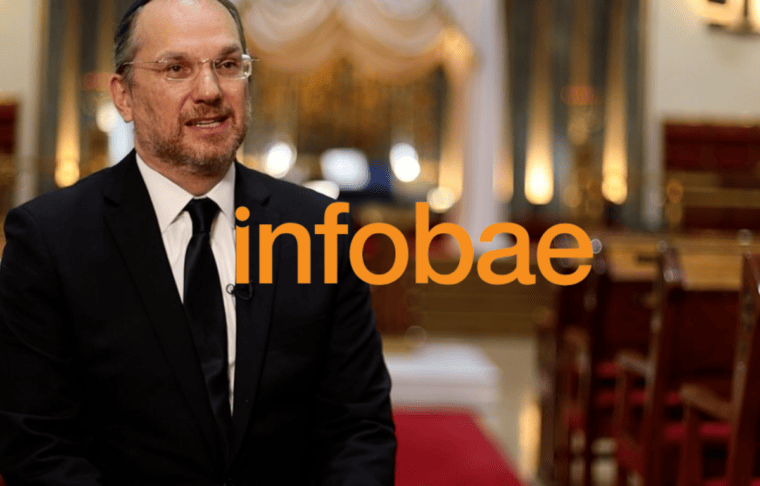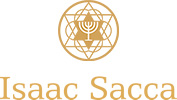Isaac Sacca and the message of Pesach

Article published on March, 25th in Infobae
“The most unbearable situation for human beings is not being able to exercise their own will.”
The Chief Rabbi of the Sephardic Community of Buenos Aires described the holiday that celebrates the creation of the people of Israel. On the eve of the “Jewish Passover”, the narration of the historical tale and the current idea of the concept of freedom.
The arrival of the children of Israel in Egypt, slavery and forced labor at the hands of the tyrannical Pharaoh, the miraculous salvation blessed by divine action. Everything is narrated in the book of Exodus of the Pentateuch: it is the chronology of Pesach, the most important family celebration of the Jewish tradition. The holiday remembers and honors the liberation of the Hebrew people from Egypt after 210 years of slavery and, as a consequence, the birth of the Jewish people. And although slavery is a concept apparently rooted in the past, the spirit of the feat is still valid and is translated into modern remnants of oppression, trafficking, kidnapping, exploitation and forced labor.
Pesach means “to skip”, “to sauté”. His reference refers to a divine choice: the historical epic of “the plague against the firstborn”, at that time considered the leaders of society. The “skipping” discriminated the location of the others. The belief of the Torah states that God excluded the oppressed people from the ten plagues of Egypt. It was explained by Isaac Sacca, Chief Rabbi of the Sephardic Community of Buenos Aires and President of Menora, World Jewish Organization: “God wanted to show that one person cannot oppress others. That is why he punished the first-born, did justice to them and skipped the house of the oppressed, the poor, the slaves, the persecuted ”.
He described Pesach as “the inaugural Jewish holiday, the first holiday that constitutes the creation of the people of Israel.” And he gave context: “The people of Israel were historically enslaved under the yoke of the pharaohs since they were a clan, since they were a family. During the captivity, during that slavery, they increased until they became a people, but an enslaved people. At a certain moment in History, this people claimed freedom, they were inspired by God, through a leader they achieved freedom and in this way what we know as the Jewish people or the people of Israel was established for the first time. That is Pesach, that is the historical narrative of this important commemoration in the Jewish calendar ”.
“The essential message of Pesach remains valid: to fight for the freedom of the human being in all societies in order to achieve a civilization based on respect for the autonomy of the other,” said Rabbi Isaac Sacca.
The rabbi discovers two intrinsic messages in the celebration of what is commonly called “the Jewish Passover”: “One is a message from the Jewish community, which is the historical narrative of the constitution of the people of Israel . But also the narration of the creation of the State of the people of Israel corresponds to a moral message. Not all the people’s narratives have a coincidence with a moral or ethical message. The constitution, the birth, the narrative of the creation of the people of Israel coincide with the moral and ethical concept of freedom and human rights: no one can oppress the other, human beings are all equal before God. In this way the people of Israel was born, under this concept that can be acquired without the narrative and without the historical event, and in which the moral message coincides with the historical narrative ”.
Pesach hides an ethical and moral message: reflection on freedom has no periods or temporal distortions. Sacca points out its validity throughout history and clarifies that human beings have always lived enslaved in two dimensions: “the sociological dimension, those who enslave and oppress each other until today, and psychological slavery, in which each person voluntarily surrenders to his own passions, to his own vices, and enslaves his attitudes and his thoughts to the lowest desires ”. “In such a way,” he added, “Pesach, which constitutes the beginning and the foundation of the people of God from which all religions came, is sending us a message also today: we must learn to free ourselves from other men and from our own vices, free ourselves from the ties of our body and let the reins of our life be taken by the spirit and reason ”.
This is so current that the pandemic served, from the rabbi’s vision, to perceive what the Hebrew population experienced under the pharaonic yoke. “This time we live it as a palpable experience, in our own flesh. It would be good to take advantage of this unfortunate experience that all human beings had to go through to make a kind of reflection on how the spirit feels when a man is enslaving another person or when a man is enslaved by a personal vice. There is no more unbearable situation for the human being than not being able to exercise his own will, when he is depending on the will of others ”.
This feeling means for the rabbi “to be dead while alive”: “That is why the birth of a people or the birth of a person is, in fact, his ability to exercise his freedom. Therefore, the Jewish people are only born when they acquire freedom, because while they were enslaved in Egypt, it was as if they did not exist. This is a message for all humanity, it is not a Jewish message ”, interpreted the Chief Rabbi of the Sephardic Community.
Pesach, which will begin at sunset on Saturday, March 27th, and end on the afternoon of Sunday, April 4th, is nourished by family company. Unlike other Jewish festivals, the central manifestation occurs within the family, in the warmth of the home. “Here the fundamental commandment is to transmit to the new generation the identity, the ideology to which they belong through a historical tale, and not through a dialectical, academic or philosophical speculation. On Pesach, a story is told, a story which contains the necessary elements to create an identity and to transmit a moral message ”, defined Sacca.
The celebration consists of fifteen steps: “It begins with a toast called Kadesh, then there is a procedure to wash hands, another to eat a specific food that refers to slavery in Egypt, bitter herbs, a jam that looks like the clay with which they built the bricks to make the pyramids and the other cities that the Hebrews built in Egypt, then you eat the matzah, the food, you pray, the Haggadah is told and at the end it finishes with a blessing. Those fifteen steps, says the rabbi, are permeated in the memories of those who listen to the narrative. “Even if one does not practice Judaism a lot throughout the year, almost everyone remembers some Pesach experience at a grandmother’s house or at the parents’ house. That is what creates the identity of a people “, he valued.
This construction of collective identity is one of the predominant values in the festival. As the rabbi wrote, “on Pesach we constitute ourselves as a people and a community: we tell our story and recreate it, building a collective memory that unites us and supports our values. Each people and culture has their particular symbols and narratives, which give meaning to the world and build their own identity. One of the fundamental messages of Pesach is that the construction and maintenance of identity are based on the transmission of values in the family, focussing on the search for shared narratives ”.
Source: www.infobae.com

